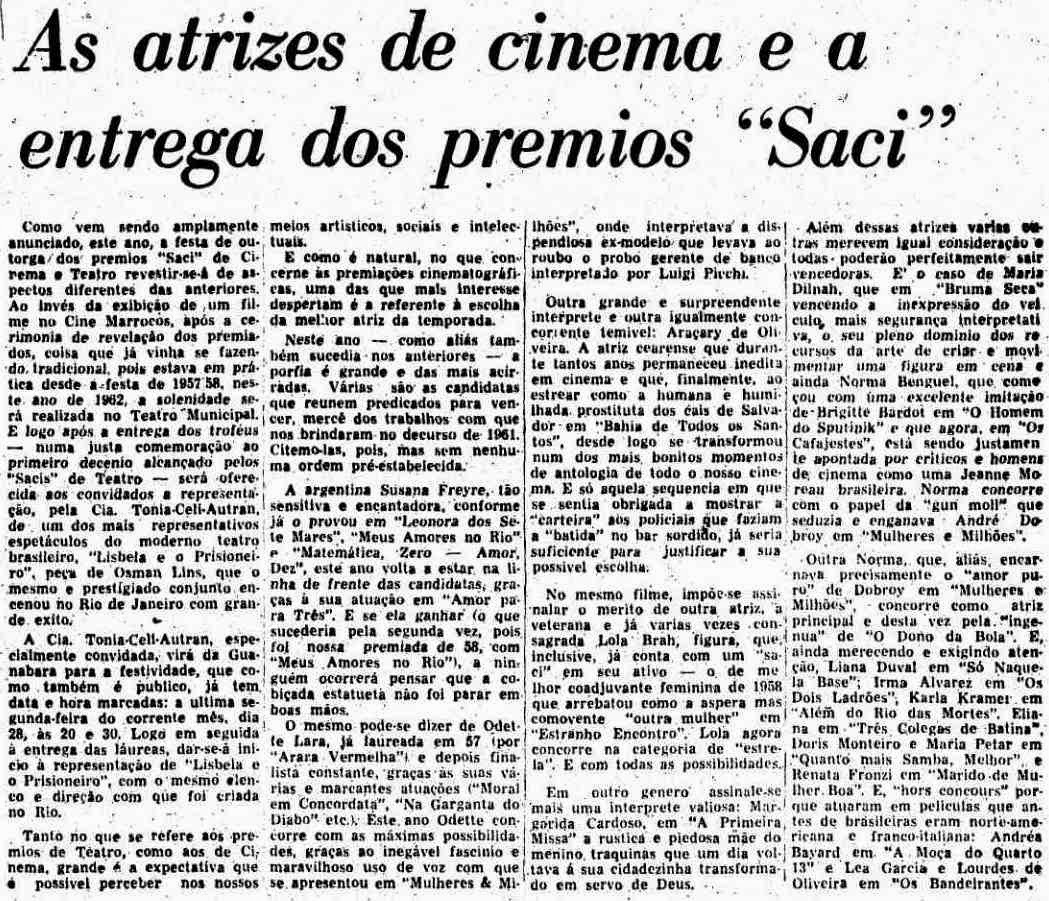25 March 1962 -
8 April 1962 -
6 May 1962 - OESP previews the nominations for 1961 Sacy for best actress: Susana Freyre, who had already won a Sacy in 1958, for 'Meus amores no Rio'; Odete Lara, who won the best actress Sacy for 'Arara vermelha' in 1957, this time is nominated for 'Mulheres & Milhões' who plays a seductress who works her power over Luigi Picchi; Araçary de Oliveira, from Ceará, is nominated for playing a prostitute in 'Bahia de todos os santos'; Lola Brah, originally from Russia, is the 4th nominated for best actress. Miss Brah has won a Sacy for 'best supporting actress' in 1958, for playing the 'other woman' in 'Estranho encontro'; Margarida Cardoso is nominated for 'A Primeira Missa'; Maria Dilnah for 'Bruma seca'; Norma Benguel for playing a 'gun moll' in 'Mulheres & Milhões'; Norma Blum for playing an engenue in J.B. Tanko's 'O dono da bola'; Liana Duval for 'Só naquela base'; Irma Alvarez for 'Os dois ladrões'; Karla Kramer for 'Além do Rio das Mortes'; Eliana Macedo for 'Três colegas de batina'; Doris Monteiro and Maria Petar for 'Quanto mais samba melhor' and finally, Renata Fronzi for 'Marido de mulher boa'.
10 June 1962.
20 May 1962 - 'Os cafajestes' were finally released and here's daily 'O Estado de S.Paulo' review of it.The cinema columnist could only compare Angolan Ruy Guerra's 'Os cafajestes' with France's 'nouvelle vague' and Italy's 'modern cinema'. Not happy with 2 different sources, the columnist goes further a-field and quotes Swedish 'disagreeable influences' like Ingmar Bergman's 1949's 'Törst' (Sede de paixões) and 1953's 'Gycklarnas afton' (Noites de circo). When you thought you were on safe ground the columnist says 'Os cafajestes' also borrowed from the Japanese cinema of Gosho Ohba, Naruse and Maruyama. What a mouthful!
10 June 1962 - just a few weeks after 'Os cafajestes' was released... 'Assassinato em Copacabana' (Murder in Copacabana) comes out.
10 June 1962 - just a few weeks after 'Os cafajestes' was released... 'Assassinato em Copacabana' (Murder in Copacabana) comes out.
3rd Septembert 1962 - Roberto Faria's 'Assalto ao trem pagador' (Robbery of the pay train)
A bold heist pulled off by slum dwellers turned payroll thieves teeters on the edge of dissolution due to the gang’s inability to hang together - proving that class solidarity is a frustratingly ephemeral thing. Non-actor Eliezer Gomes gives a towering performance as the mastermind who goes below and beyond to keep the caper from cratering.
A gang of six men from the slum, Grilo Peru, (Reginaldo Farias), Tonho (Átila Iório), Cachaça (Grande Otelo), led by Tião Medonho,(Eliezer Gomes) robs a pay train on the Central do Brasil Railroad, in the State of Rio de Janeiro. An unfulfilled agreement leads to the squandering of the money by Grilo Peru, who buys an imported car and has an affair with Marta. Tião Medonho, in view of the broken pact, decides to kill Grilo Peru. The police find clues about the other gang members, as they also go on a spending spree. Tião is lured into an ambush and is killed. Zulmira (Luíza Maranhão), his wife, desperate, returns the rest of the money hidden in a wardrobe, to escape the pressure from the police and the press.
Jorge Dória plays the police chief; Ruth de Souza plays Judith, Miguel Angelo plays Miguel Gordinho; Gracinda Freire plays Miguel's wife; Helena Ignez plays Marta; Miguel Rosenberg plays Edgar; Dirce Migliaccio plays Edgar's wife; Clementino Kelé plays Lino.


.PNG)
.PNG)









No comments:
Post a Comment